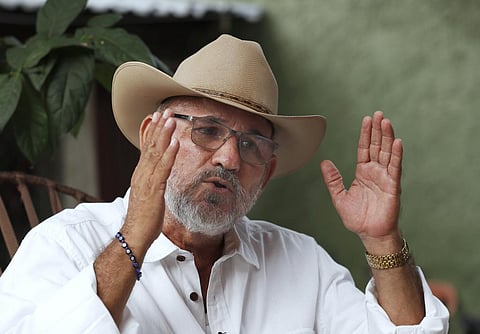

MEXICO CITY: The leader of an armed civilian movement that once drove a drug cartel out of the western Mexico state of Michoacan has been killed, authorities confirmed Thursday.
Tributes quickly rolled in for slain “self defense” leader Hipólito Mora. He was one of the last surviving leaders of Michoacan’s armed vigilante movement, in which farmers and ranchers banded together to expel the Knights Templar cartel from the state between 2013 and 2014.
Mora was one of the few fighters to reman in his hometown after the struggle, tending to his lime groves. But Mora complained in recent years that many vigilante forces were later infiltrated by the cartels and that gang violence was worse than ever.
“He was a man who could not be corrupted, a natural leader, an authentic voice,” said Rev. Gregorio López, a Roman Catholic priest who accompanied and participated in the self-defense movement of that time. All the leaders of the movement were in constant danger, and López was known for wearing a flak vest while celebrating Mass.
Because of the dangers and threats Mora faced — a son was killed by a drug gang in 2014 — he normally traveled in an SUV with bulletproofing, along with a small guard detail, some of them former vigilantes who had been hired as police officers.
The Michoacan state prosecutors office said unidentified gunmen cut off Mora's vehicle and his bodyguards' pickup on a street in his hometown of La Ruana. They opened fire, riddling Mora's vehicle with bullets, and then set it afire, the office said.
Three other men, believed to be members of his security detail, were also killed. Prosecutors said one of the four corpses matched Mora's description.
Gov. Alfredo Ramírez wrote in his social media accounts that “we deeply regret the cowardly killing of Hipólito Mora,” adding: “We will get to the bottom of what happened and justice will be done.”
Guillermo Valencia, a leader of the Institutional Revolutionary Party in Michoacan, said in a statement that Mora was “a man who deserved to be in the history books, not killed the way he was.” He "never ceased in the struggle,” Valencia said.
In 2022, Mora told The Associated Press that the situation in Michoacan had become worse than when he led farmers from his hometown in the fight to expel the Knights Templar cartel in 2013. That cartel was largely disbanded, but it was replaced by the Viagras cartel, also known as Carteles Unidos, which has gone on to kidnap, kill and extort money from farmers and businesses.
“In terms of safety, we are worse than ever,” Mora said in 2022 following a meeting with senior government officials in Mexico City to demand more protection for Michoacan.
He complained the federal government had been fighting an incursion by the Jalisco cartel into the state, but had done little to combat the homegrown cartels.
“They have to fight all the cartels, not just one,” Mora said.
Mora's criticism was “spot on,” noted Falko Ernst, a senior analyst at the International Crisis Group, who said the government's strategy has been “to team up with the Carteles Unidos and push the Jalisco Cartel offensive back.”
Such a short-term strategy — one pursued by successive state and federal administrations — has not brought peace to Michoacan, and Mora's slaying is an illustration of that, Ernst said.
“That Hipolito has been under threat for this long, and has been so publicly a number of times like a stone in the shoe of successive governments, that he would perish now, so long after the original uprising, just underlines how acute the actual situation still is,” Ernest said.
The first time journalists from AP interviewed Mora in 2013, he and his followers in La Ruana had been cut off from the outside world by Knights Templar gunmen.
Tired of the gang's kidnappings, threats and demands for protection payments, along with it decreeing when farmers could harvest their limes, who they could sell them to and what price they would get, townspeople rose up in arms.
Mora led a vigilante force in erecting improvised stone barricades and hanging banners on roads into town reading “S.O.S., Women and Children in Danger!”
After the vigilantes had held off the cartel alone for months, Mexican troops finally rolled in to rescue them. Mora led a rousing cheer, shouting: “This war has been won!"
That hope was dashed. Mora was even jailed briefly by the government, and he later ran unsuccessfully for congress and the governorship. He often talked about the sense he knew he might die, but never betray the movement.
Mora's last Facebook post came the day before he was killed, showing he had returned to his farm. It included a photo of him and a friend standing in a lime orchard.
“I'm taking care of my own business. I like the countryside,” Mora wrote.